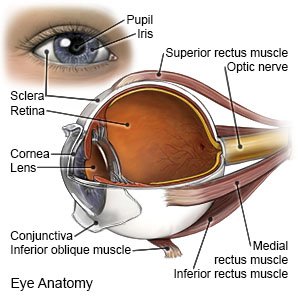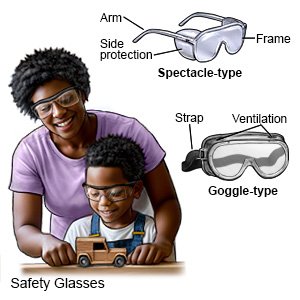Orbital Fracture
Medically reviewed by Drugs.com. Last updated on Aug 4, 2025.
AMBULATORY CARE:
An orbital fracture
is a break in one or more of the bones around your eye. Orbital fractures are caused by a hard blow to the eye area. Car accidents and sports injuries are the most common causes.
 |
Common signs and symptoms:
Signs and symptoms depend on the type of fracture. You may have any of the following:
- Pain and bruising around the eye
- Swelling of the forehead, cheek, or area around the eye
- Pain or trouble moving your eye
- Double, blurry, or decreased vision
- Numbness
- Blood in the white part of your eye
- Eyes that bulge or sink
Seek care immediately if:
- Your vision starts to blur.
- You start to see double.
- You suddenly lose your vision.
- You have severe eye pain.
Call your doctor if:
- You have a fever.
- Your symptoms do not go away, or they get worse.
- You have questions or concerns about your condition or care.
Treatment:
Your provider may want to wait until the swelling decreases to decide if surgery is necessary. Minor fractures may not need surgery. You may need any of the following:
- Medicines:
- Decongestants can help decrease sinus pressure or congestion. This can help relieve pressure on your eye.
- Antibiotics may be prescribed to help prevent an infection.
- Steroids may be needed to decrease swelling.
- NSAIDs , such as ibuprofen, help decrease swelling, pain, and fever. This medicine is available with or without a doctor's order. NSAIDs can cause stomach bleeding or kidney problems in certain people. If you take blood thinner medicine, always ask your healthcare provider if NSAIDs are safe for you. Always read the medicine label and follow directions.
- Prescription pain medicine may be given. Ask your healthcare provider how to take this medicine safely. Some prescription pain medicines contain acetaminophen. Do not take other medicines that contain acetaminophen without talking to your healthcare provider. Too much acetaminophen may cause liver damage. Prescription pain medicine may cause constipation. Ask your healthcare provider how to prevent or treat constipation.
- Take your medicine as directed. Contact your healthcare provider if you think your medicine is not helping or if you have side effects. Tell your provider if you are allergic to any medicine. Keep a list of the medicines, vitamins, and herbs you take. Include the amounts, and when and why you take them. Bring the list or the pill bottles to follow-up visits. Carry your medicine list with you in case of an emergency.
- Surgery may be needed if your fracture is severe and has decreased the movement and function of the eye. Surgery may also be needed if the eye needs to be repositioned in the socket.
Help your eye heal:
- Apply ice on your injured eye for 15 to 20 minutes every hour or as directed. Use an ice pack, or put crushed ice in a plastic bag. Cover it with a towel before you apply it to your eye. Ice helps prevent tissue damage and decreases swelling and pain.
- Do not blow your nose until your fracture has healed, or as directed. Blowing your nose can put pressure on your eye socket.
- Try not to sneeze. If you have to sneeze, do it with your mouth open to decrease pressure on your eye.
- Do not use a straw until your fracture has healed. Straws can increase the pressure in your face and eye socket.
Help prevent an orbital fracture:
- Wear safety glasses, eye shields, or goggles. These items can prevent eye injury. Make sure the eyewear wraps around the sides of your face. Wear protective eyewear during sports. Do not use regular eyeglasses for eye protection. They will not protect your eyes from injury.

Follow up with your doctor or ophthalmologist as directed:
Write down your questions so you remember to ask them during your visits.
© Copyright Merative 2025 Information is for End User's use only and may not be sold, redistributed or otherwise used for commercial purposes.
The above information is an educational aid only. It is not intended as medical advice for individual conditions or treatments. Talk to your doctor, nurse or pharmacist before following any medical regimen to see if it is safe and effective for you.
Further information
Always consult your healthcare provider to ensure the information displayed on this page applies to your personal circumstances.
